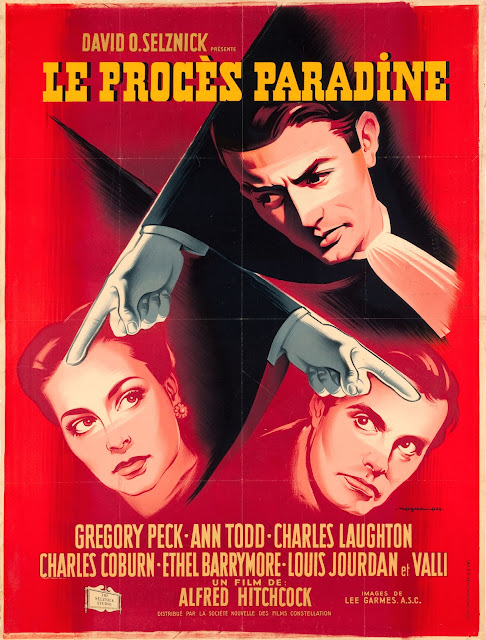Director: Alfred Hitchcock
Gregory Peck, Ann Todd, Charles Laughton, Charles Coburn, Ethel Barrymore, Louis Jourdan, Alida Valli, Leo G. Carroll, Joan Tetzel, Isobel Elsom.
Why does this movie seem so dull? The acting isn't bad once you get past Gregory Peck's British accent. None of the performances are outstanding, they're just not bad. The roles restrict the performers' range. I think Alida Valli smiles once. Louis Jourdan seems to have only one expression, a bitter, barely controlled anger. If he tried to smile he might crack. The actor given the best lines is Charles Laughton, who hams it up and brings a bit of life to the screen. "Remarkable how the convolutions of a walnut resemble those of the human brain." And that flabby, sweaty palm as he takes the hand of Peck's wife, squeezes it lasciviously, and places it on his thigh. Well, I can think of three reasons why it's dull. (1) It's overwritten. The script needed somebody like Daryl F. Zanuck to hack out some of the underbrush. Peck is questioning Valli in court. It goes something like this: Peck: "What did you say to Latour." Valli: "I told him to leave the room." Peck: "But why did you tell him to leave?" Valli: "Because I no longer wanted him present." Peck: "And why did you no longer want him present?" Valli: "His presence was disturbing." And so on. How did the jury stay awake? Some of the scenes are pointless. Not the sort of interesting meanders you might find in other Hitchcock movies. Just pointless. Peck visits a country house to talk to Latour, who promises to show him the garden and then beats it pronto. An hour or two later Latour shows up banging on the window of Peck's room at the inn, having changed his mind for no apparent reason. The five-minute conversation that follows could have been condensed into half that time and benefitted from some supplementary bits of business. Instead the two adversaries sit there like mahogany idols hiding information from one another. That's a poor script for you. (2) Hitchcock's imagination seems to have been asleep during the shooting. Perhaps the director himself was asleep. (It happened from time to time.) It isn't necessary for every Hitchcock film to have a bravura shot in it. The camera needn't always swing down from an upper story and wind up with a closeup of the key in someone's hand. But there is, maybe, one shot in this flick that bespeaks Hitchcock. When Andre Latour is first called into the courtroom as a witness, Hitchcock keeps the camera focused on Valli's face in the defendant's chair and circles it slowly around her so that we see Jourdan walking slowly into the room past her, behind her, and can almost feel her desire to turn around and look directly at him. (3) Hitchcock had a great sense of humor and it's entirely absent from this movie. It must in fact rank among the least humorous films he's ever made. And it's surprising, because he was usually able to insert some piece of business into even his most serious works. (Not including "Vertigo.") Often the humor centers around meals. A dowager stubs out a cigarette in a jar of cold cream, or the yolk of a fried egg. A police inspector is forced to eat fancy dishes that a Kurdish camel driver would turn up his nose at. Or the humor lies in montage, as in "The Man Who Knew Too Much," when Jimmy Stewart escapes from a clumsy set-to with the staff at a taxidermist's and the scene ends with a shot of a stuffed lion's head gaping at the slammed door. SOMEthing, anyway, to lighten things up. But not here. Put it all together and you have a pretty dull movie, one of the several serial flops that Hitchcock ground out in the post-war period. It isn't exactly painful to sit through. It's just that it's not very enjoyable.

































No comments:
Post a Comment